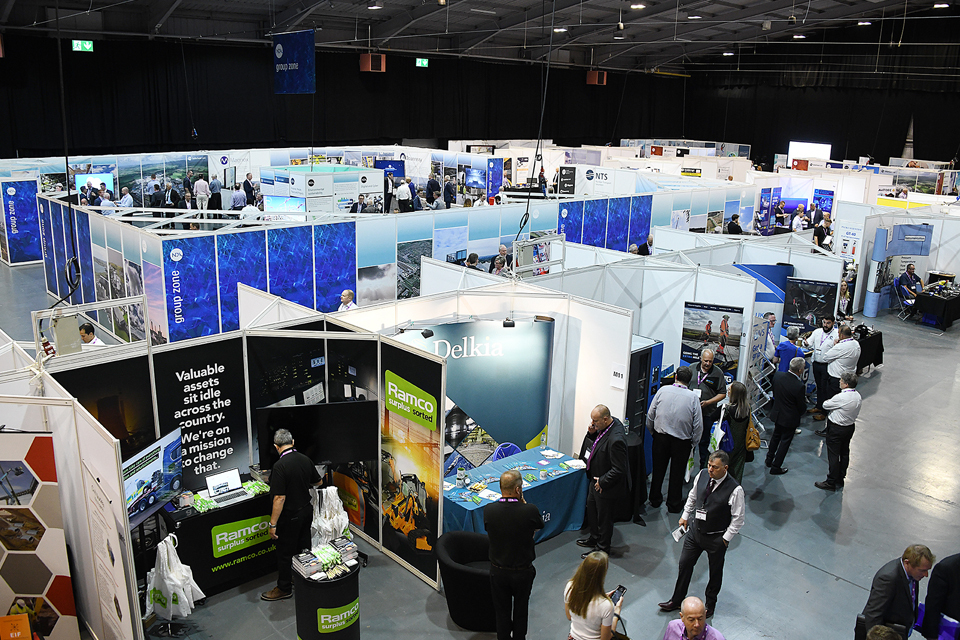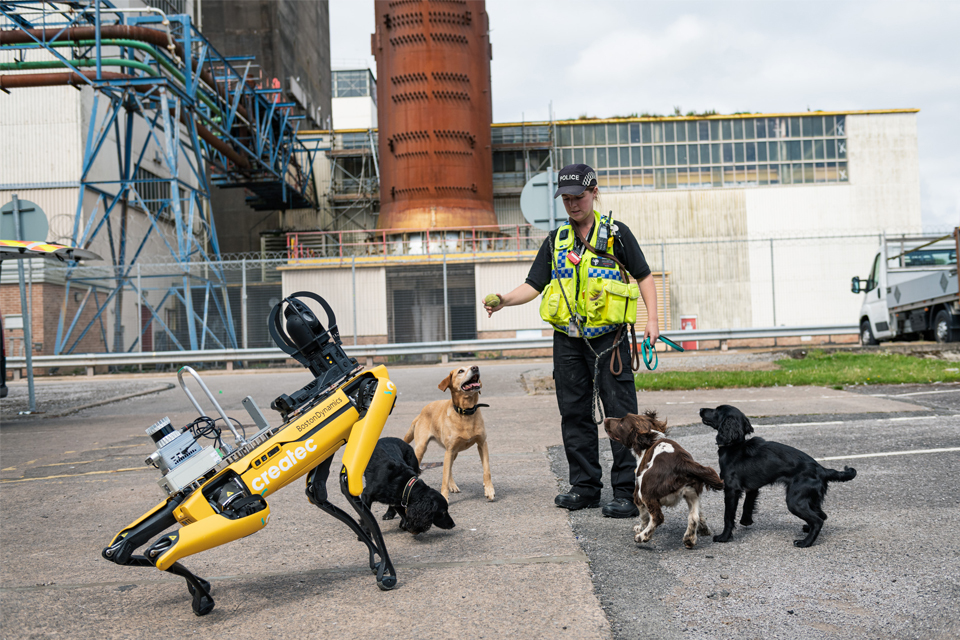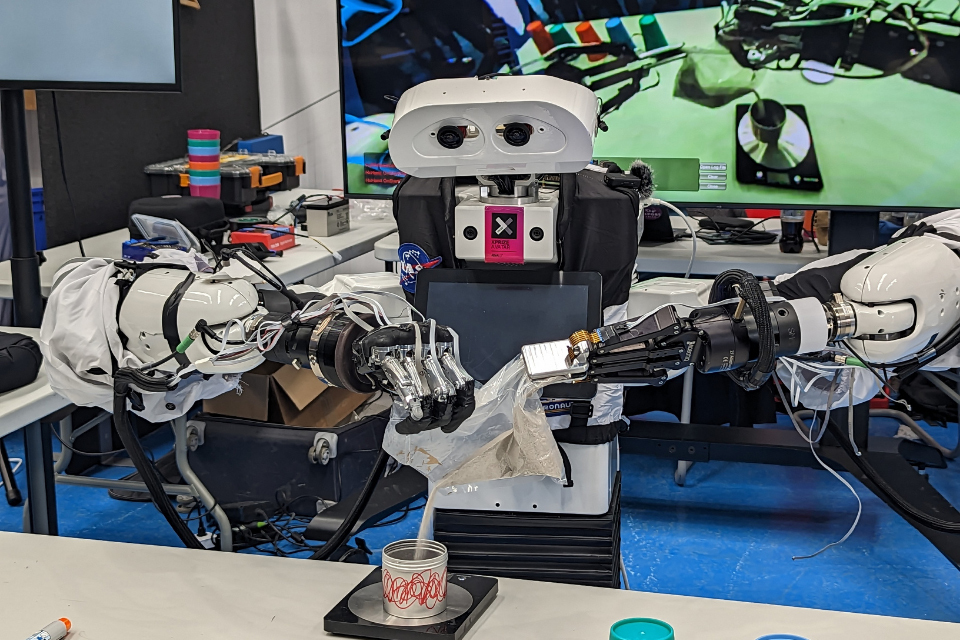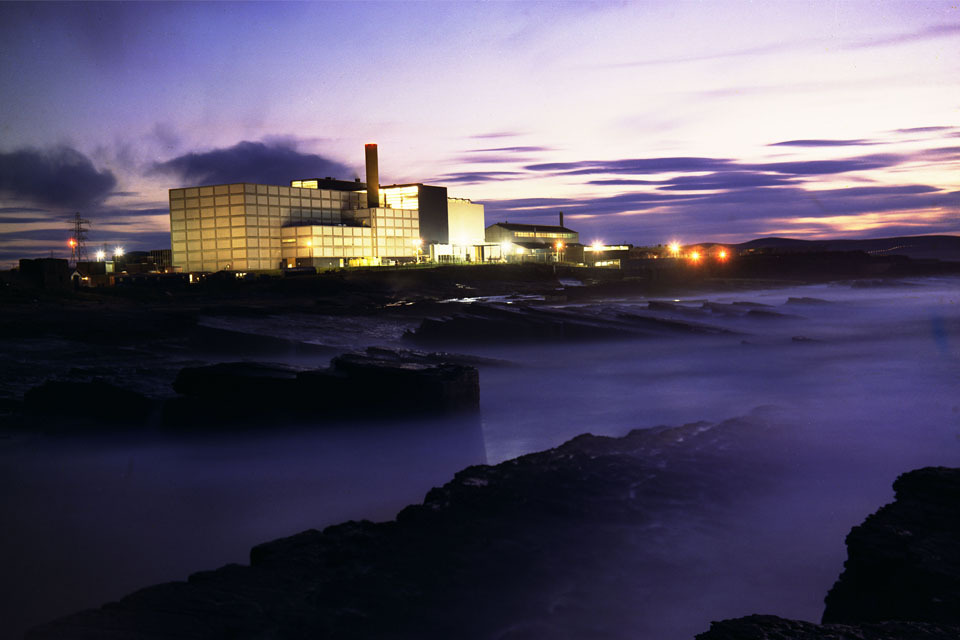Case studies: Critical enablers
Updated 2 October 2023
Overview
Our fifth strategic theme, critical enablers, covers the important activities needed to support the overall delivery of our mission.
Health, safety, environment and wellbeing
Safety is, and always will be, our number one priority. Our focus is to reduce the highest hazards and risks, while ensuring safe, secure and environmentally responsible operations at our sites. It’s our duty to carry out this highly complex mission safely and efficiently while ensuring people and the environment are safeguarded at all times.
We aim to be recognised as a leading environmental remediation organisation. Our environment strategy is maturing and we are working towards a low carbon future and improved environmental outcomes to ensure that our mission outcomes are delivered in an environmentally sustainable manner. Our strategy for health and wellbeing is to provide a supportive working environment across the NDA group by actively promoting and working with our employees and trade unions (see People) to develop and implement policies and standards with employee health and wellbeing at the forefront.
Sustainability
Sustainability is one of the NDA’s critical enablers, added for the first time as part of our Strategy published in 2021, with the objective to ensure that mission outcomes and the journey to deliver them are sustainable.
Security and resilience
Security is a fundamental element of all civil nuclear operations. We are committed to providing proportionate security and resilience solutions throughout the decommissioning lifecycle.
We recognise the many threats that face the NDA and its supply chain, from cyber attacks, data breaches and Information Technology (IT) system failures to extreme weather conditions, global pandemics and terrorism.
Our strategy brings the NDA operating companies together, taking a group-wide approach to security and resilience in order to improve collaborative working and, where appropriate, implement a shared approach to security arrangements.
Cyber security
Our Cyber Security Strategy is well established, but requires further integration with organisational and operational planning across the whole NDA group. The nature of the threat continues to change and is so prevalent that we have established a group-wide programme (Cyber Security Resilience Programme) to ensure that we become an increasingly harder target for those who seek to do harm to our businesses or our sites.
We will ensure that we can collectively protect ourselves, detect cyber incidents early and have mature response and recovery plans to minimise disruption to our core mission of nuclear clean-up and environmental restoration.
Research, development and innovation
Delivering our mission needs many ‘never- done-before’ solutions, which require significant innovative and novel engineering approaches.
Our strategy is to solve the challenging technical problems safely, while aiming to be more effective, efficient, and wherever possible, to impose less cost on the taxpayer. Research, development and innovation is essential to decommissioning our sites and is delivered in partnership with our supply chain.
People
We strive to create great and diverse places to work so that we can retain our people, maintain our skills base and recruit into our businesses. Our people strategy has three main focus areas: ensuring we have the right people at the right time to deliver the mission; creating the culture in which our people can thrive; and working in partnership with our recognised trade unions and the broader stakeholder community.
Asset management
The NDA group has assets in all stages of the asset management lifecycle and we have a responsibility to secure safe, environmentally considerate and cost-effective asset management across the group.
To ensure our assets achieve this objective, we need a continually improving asset management approach informed by good practice that focuses on value for money mission delivery.
Our strategy continues to address the enduring risk that poor asset performance adversely impacts our mission. We will further develop our strategy for new and existing assets and look to obtain through-life asset management plans that fully integrate new assets into current operations.
Supply chain
A diverse, ethical, innovative, and resilient supply chain is essential to delivering the NDA mission and provides value for money for the UK taxpayer. With our One NDA way of working, we are now uniquely placed to identify synergies across the group and develop further collaborative procurement activities. We continue to broaden the routes to market and our supply base for the NDA group.
A more diverse and sustainable range of suppliers with nuclear experience will provide greater resilience and access to innovative solutions for safe, secure and cost-effective decommissioning.
Information governance
The NDA owns most of the information produced and managed by the NDA group. We collaborate with and support all businesses within the group in order to comply with statutory and regulatory obligations and realise the value of these assets to enable delivery of the NDA mission.
We have embedded a group-wide policy, procedures and guidance and delivered key centralised infrastructure consisting of an archive and long-term records management facility (Nucleus), a secure collaboration platform (the NDA Hub) and a secure private cloud.
Socio-economics
We have a statutory responsibility to support the maintenance of sustainable local economies for communities living near NDA sites and, where possible, contribute to regional economic growth.
The NDA group’s socio-economic strategy is built upon supporting sustainable incomes, resilient economies and thriving communities.
Our approach is to work locally. This means working in partnership with local authorities, constituency MPs and organisations to better understand local needs. In supporting our local communities, our primary strategy is to ensure that decisions that direct the delivery of our decommissioning mission support local sustainable and inclusive economic growth and greater social value wherever possible.
To ensure our local communities can attract future economic activity, we prioritise support and funds for projects which are consistent with our responsibilities to the UK taxpayer. We work in partnership with others to increase the impact of our funding.
Public and stakeholder engagement
Open and transparent engagement is key to building support, confidence and trust among all our stakeholders and we continue to encourage two-way dialogue about strategic direction and when consulting on statutory documents. The open dialogue we have with our stakeholders has encouraged the discussion of difficult and complex issues. We are committed to listening to and integrating a diverse range of views and giving confidence to stakeholders that their views and input will be considered fully as part of this engagement, helping to drive and influence progress in delivering the NDA’s mission. This would not be possible without the support of our stakeholders and the trust we have built with communities and local authorities close to our nuclear sites.
Transport and logistics
The effective delivery of the NDA mission relies on our ability to transport radioactive materials (for example, spent fuel, radioactive waste, contaminated items) and bulk materials (for example, spoil, concrete, raw materials) to, from and between our sites. In 2021, we brought together the extensive transport and logistics expertise of our subsidiaries, INS and DRS, into a single transport division, Nuclear Transport Solutions (NTS), to support the NDA group and provide value beyond the NDA mission, both in the UK and overseas. NTS specialises in the operational, commercial, engineering, legal and regulatory requirements that underpin nuclear transport and logistics operations.
International relations
The NDA’s operating environment is inherently international and the risks we manage transcend national boundaries.
The materials in our inventory have safety and security considerations on a global scale, and the policy framework in which our strategy is developed is underpinned by international standards and guidance.
The nuclear decommissioning market is growing globally and we will continue to use our experience and relationships to enhance the reputation of the UK nuclear industry, sharing our experience and skills, accessing peer reviews, and conducting joint technology development projects.
To find out more about our critical enablers please refer to our Strategy which can be found at Nuclear Decommissioning Authority Strategy 2021 (www.gov.uk)
Stakeholder engagement case study - Stakeholder survey shows positive progress - Summary
The NDA’s latest stakeholder survey showed positive progress in external views of the NDA’s mission, and in its strategic approach. An independent survey of 829 stakeholders showed marked improvements in stakeholder perception of the NDA’s performance, transparency and leadership. Key highlights include the percentage of stakeholders who said the NDA acts in an open and transparent manner, rising to 89% - compared to 78% previously. The percentage of people who believe the NDA is positively helping to create sustainable communities also rose to 87% from 75% in 2020.

Stakeholder event
For more information
Survey reflects increasingly positive stakeholder’s view of NDA - GOV.UK (www.gov.uk)
Environment case study - NDA supports Cumbria Coastal Community Forest - Summary
Nuclear Waste Services and the NDA have hosted their first staff tree planting event, with 720 trees planted at Pelham House in Cumbria. Volunteers included senior leaders, apprentices, and support from Cumbria Woodlands.
The Cumbria Coastal Community Forest is a partnership project between Cumbria Woodlands and local authorities which the NDA is supporting with £200,000 of funding. Thousands of trees will be planted to bring people closer to nature and create corridors of woodlands which will enhance biodiversity and provide resilience to climate change.

NDA supports Cumbria Coastal Community Forest
For more information
NDA announces £200,000 boost for Cumbria’s Coastal Community Forest - GOV.UK (www.gov.uk)
Socio-economics case study - Significant leverage achieved from socio-economic projects - Summary
Significant progress has been made on projects which have been made possible by NDA group funding and other third-party investments we have enabled. These include a £7.5 million investment in Cleator Moor’s Industrial Solutions Hub, £900,000 group investment in the Morlais Tidal Energy Project in Angelsey and £3 million investment in the Sutherland Spaceport project.
We have a unique statutory responsibility set out in the Energy Act 2004 to have regard for the impact of our activities on communities living near the group’s sites. This is done through a programme of grant funding aimed at creating opportunities for economic growth, diversification, and employment. This is in addition to the already significant nationwide economic impact of our work, as well as the efforts to deliver the maximum social value from operations.

Significant leverage achieved from socio economic projects
Case study
The NDA has a unique statutory responsibility set out in the Energy Act (2004) to have regard for the impact of our activities on communities living near our sites. This is done through a programme of grant funding aimed at creating opportunities for economic growth, diversification, and employment. This is in addition to the already significant nationwide economic impact of the NDA (reference to the relevant page) and the work that we do to deliver the maximum social value from our operations as required by the Public Services (Social Value) Act (2012).
As a group, the NDA is committed to working closely with our local partners to co-create projects which can be transformative. As a result, the NDA group has helped to deliver economic regeneration projects in our communities by providing grant funding to projects which in turn unlock significant additional inward investment.
During FY 2022/23 significant progress has been made on projects which have been made possible by NDA group funding and other third-party investments we have enabled. Some examples of these are provided below:
Industrial Solutions Hub (iSH) Cleator Moor, Cumbria
The iSH is an initiative designed to grow and diversify the economy of West Cumbria away from an over reliance upon Sellafield. The iSH will facilitate a diverse commercial cluster that harnesses the unique skills of the region and creates sustainable opportunities for the direct benefit of the people of Cumbria and the UK economy. The iSH aims to create over 700 jobs in West Cumbria.
Progress in 2022/23: NDA group funding helped to secure inward investment from both the Cleator Moor Town Deal and Levelling Up Fund. iSH has been formally established as a company with headquarters in Cleator Moor.
NDA group Investment: £7.5m NDA, £6.8m Sellafield
Leverage: £44.5m, including £22.5m HMG investment as part of the Cleator Moor Town Deal and £20m from Levelling Up Fund.
Morlais Tidal Energy Project, Anglesey
The Morlais proposal will develop infrastructure to enable tidal stream turbines to be deployed off the coast of Anglesey to generate electricity. Morlais has the potential to generate up to 240MW of electricity – this is estimated to be enough for around 180,000 typical Welsh households. The project has the potential to create over 100 new jobs over the next ten years and will benefit the local supply chain. Any future profits are to be invested in the local communities through a community benefit fund.
Progress in 2022/23: Menter Môn has secured a 45 year lease from the Crown Estate for 35km2 of seabed off the NW coast of Anglesey up to 2059. The construction of onshore infrastructure has commenced and is being undertaken by local Welsh contractor Jones Bros Civil Engineering.
NDA group Investment: £600,000 NDA, £300,000 Magnox
Leverage: £48m from Welsh European Funding Organisation (WEFO), Welsh Government and Crown Estate.
Sutherland SpacePort
The Sutherland SpacePort is a satellite vertical launch facility now under construction in the far north of main-land Scotland. The facility is situated approximately 40 miles west of the Dounreay site and is intended to cater for the small satellite market which specifically benefits from launch at northern latitudes. The development of a new sector for the region supports diversification of the economy and reducing long term reliance on Dounreay.
Progress in 2022/23: NDA investment in SHS has been confirmed in-year, completing the funding package required to progress the project.
NDA group Investment: £3m NDA
Leverage: Approximately £30m including £2.55m of UK Space Agency funding, £9m from Highlands and Islands Enterprise and investment from the commercial operator Orbex.
Supply chain case study - Major supply chain event returns - Summary
The NDA group supply chain event, thought to be Europe’s largest decommissioning-focused networking opportunity was held last summer for the first time in three years. Around 5,000 companies make up the group’s supply chain, with almost three-quarters of UK Parliamentary constituencies home to businesses that support the mission. In the last year £1.9 billion was spent with partner companies, representing almost 55% of the NDA’s £3.5 billion budget.

Major supply chain event returns
For more information
NDA group event highlights important role of supply chain - GOV.UK (www.gov.uk)
Research, development and innovation case study - Spot the robotic quadruped gets to work at Sellafield - Summary
Teams at Sellafield worked together on a project to understand the benefits of using Spot the robotic quadruped to inspect and clean active cells that would normally require workers to enter in air-fed protective suits. This takes humans out of the hazardous area, reducing the risks to operators who can instead focus on operating Spot remotely. The work can be done faster as Spot can work in these areas much longer, and has halved the predicted costs and significantly reduced the waste generated from protective gear.

Spot the robot gets to work at Sellafield
For more information
Sellafield robotics: Using spot more for spotless nuclear clean-up - GOV.UK (www.gov.uk)
Research, development and innovation case study - Contracts awarded to fund telexistence technologies - Summary
The Defence Science and Technology Laboratory (Dstl) and the NDA working in partnership with the Defence and Security Accelerator (DASA) have announced that four innovative projects have won a share of £1.3 million funding to develop cutting edge telexistence systems. Telexistence technology has the potential to give those working in hazardous environments the capability to undertake tasks without physically being present.
Collaboration across the nuclear industry and other sectors opens the door to different ideas and experiences, a wider supply chain and creates more diversity of thought to find innovative ways to deliver the mission.

Contracts awarded to fund telexistence technologies
For more information
£1.3 million in contracts awarded to fund telexistence technologies - GOV.UK (www.gov.uk)
People case study - NDA group graduate programmes launched - Summary
A new NDA group graduate programme has been launched, bringing together all parts of the group to attract and develop new graduates to help deliver our mission.
More than 60 graduates will start a two-year programme later in the year, developing careers in professions from business and commercial to project management, engineering, science, technology and innovation.

NDA group graduate programes launched
For more information
NDA launches new group graduate programme - GOV.UK (www.gov.uk)
People case study - NTS awards and NTS’ Women Returners Programme - Summary
Nuclear Transport Solutions has won ‘Medium Organisation Award’ at the prestigious Northern Power Women Awards. The accolade was for its support for female employees, those who identify as female and its work to attract more women into the organisation, particularly through its female-focused recruitment campaign attracting a cohort of female trainee train drivers. The business was also commended in achieving gender parity in its executive team and the launch of its Women Returners Programme, aimed at helping talented women return to the workforce.

NTS awards and NTS Women Returners Programme
For more information
NTS wins big at gender equality awards - Nuclear Transport Solutions
International relations case study - Our role on the international stage
The NDA’s operating environment is inherently international and the risks we manage transcend national boundaries. We have a key role to play in working with our international partners to collaborate and share decommissioning expertise, but also to uphold the international standards and guidance that underpin the safety and security of the materials in our inventory.
This year has seen agreements signed with international partners and important inventory reports published that help to further our work in this area.

Front cover of the radioactive waste inventory document
For more infomation
Information governance case study - Heritage panels tell nuclear story - Summary
New panels have been installed at the entrance to Nucleus; the Nuclear and Caithness Archives, providing visitors with information about the story of the nuclear industry with each one describing the events of a different decade.
The panels, constructed to complement the multi-award winning design of the building, have been compiled with input from NDA group companies as well as the National Nuclear Laboratory. Installation supports the NDA’s Heritage Strategy which supports decision making across the group for identifying, safeguarding, and celebrating the civil nuclear industry’s history.

Heritage panels tell nuclear story
Case study
A brief history of the nuclear industry now on show at Nucleus
Earlier this summer eight new interpretation panels were erected at Nucleus; the Nuclear and Caithness Archives to provide visitors and staff information about the nuclear industry and to enhance the approach to the building. The panels have been constructed in polished aluminium and the shape complements the design of the building, which when opened in 2017 won numerous prestigious architectural awards.
Each one has an information board which describes the events of a particular decade selected and compiled by representatives from Dounreay, Magnox, National Nuclear Laboratory (NNL), Nuclear Decommissioning Authority (NDA), NDA Archives Ltd (NDAAL) and Sellafield.
Beginning in the 1930’s with ‘the age of atomic discovery’, the story progresses through the beginning of the nuclear industry in the 1940’s, celebrates the pioneers of the 1950’s, and explains ‘Making it Work’ in the 1960’s. They then showcase diversity and new ideas in the 1970’s, focusing on trade and exploitation in the 1980’s, and decommissioning and environment in the 1990’s. The panels conclude in the 2000’s as ‘A new millennium and a new chapter begins’.
Alongside descriptions, images and a range of photos, the boards provide key dates for events such as the start of the Prototype Fast Reactor (PFR) in Dounreay in 1974, Magnox’s first fleet of reactors operating in 1962, and Sellafield’s Thermal Oxide Reprocessing Plant (THORP) starting to operate in 1994. The panels aim to provide a balanced view of the civil nuclear industry and so also include information on events such as the Windscale Reactor Fire in 1957 and Sellafield beach contamination incident in 1983.
Each panel also has an LED light source adding colour to the surrounding Caithness stone pathway, and staff at Nucleus have planted wildflower seeds to create a meadow beneath the structures.
Feedback from visitors to Nucleus has been very positive with comments such as ‘the panels make Nucleus feel more like a heritage destination’, and ‘the new monoliths make the walkway very interesting, and the lights look amazing in the dark’.
Simon Tucker, NDA Archives Limited Managing Director says, ‘We are delighted to be able to showcase the origins of the civil nuclear industry with staff and visitors to Nucleus in such an interesting and inspiring way. These panels superbly compliment the architectural drama of the building whilst at the same time informing people about our industrial history and I am very grateful to the team that has worked on this’.
The panels are one of many deliverables outlined in the NDA’s Heritage strategy which is currently in development. The strategy supports decision making across the group for identifying, safeguarding, and celebrating the civil nuclear industry’s history and cultural heritage, contributing to delivery of the NDA mission.
Nucleus, the Nuclear and Caithness Archives, is based in Wick, Caithness and holds, manages, and provides access to long term records while meeting legal and regulatory requirements. The facility currently employs 60 staff and has seen an ever-increasing number of visitors in the past 5 years. For more information contact: Michelle Donoghue or Paul Gyles.
Asset Management case study - Enhancing asset management processes at Dounreay - Summary
The NDA and Dounreay teams have worked with specialist companies to implement a technology not previously adopted within the group that can extract data from one of the site’s ventilation stacks and send it in real time for staff to access. As well as providing better and more timely asset management information, this approach reduces any potential harm to individuals having to access facilities and reduces the risk of human error. Demonstration of this capability is shaping a concept that is now being actively pursued in other parts of the group which is not limited to ventilation stacks but can be used now in any system that already measures data.

Enhancing asset management processes at Dounreay
Case study
The NDA asset management team has worked with colleagues at Dounreay to connect its infrastructure using innovative IT approaches.
Operational processes are heavily manual, with information and data collection often performed by staff members writing results and recording them on paper before being manually recorded in databases.
Working in partnership with specialists from Jacobs, PA Consulting, local specialists and IT partners, a new approach has been implemented which captures data from the site’s north stack ventilation system and makes it available securely and in real-time for staff to view, analyse and make informed decisions in a timely manner, reducing the risk of asset failure.
Martin Grey, NDA’s Head of Asset Management, said: “This is the result of great teamwork between departments at Dounreay, as well as with the NDA and supply chain partners. In addition to reducing the speed at which information was available, the historical manual approach came with risks of human error. This new innovative and transformational approach is not only working for Dounreay but has the potential to be used across NDA group.”
